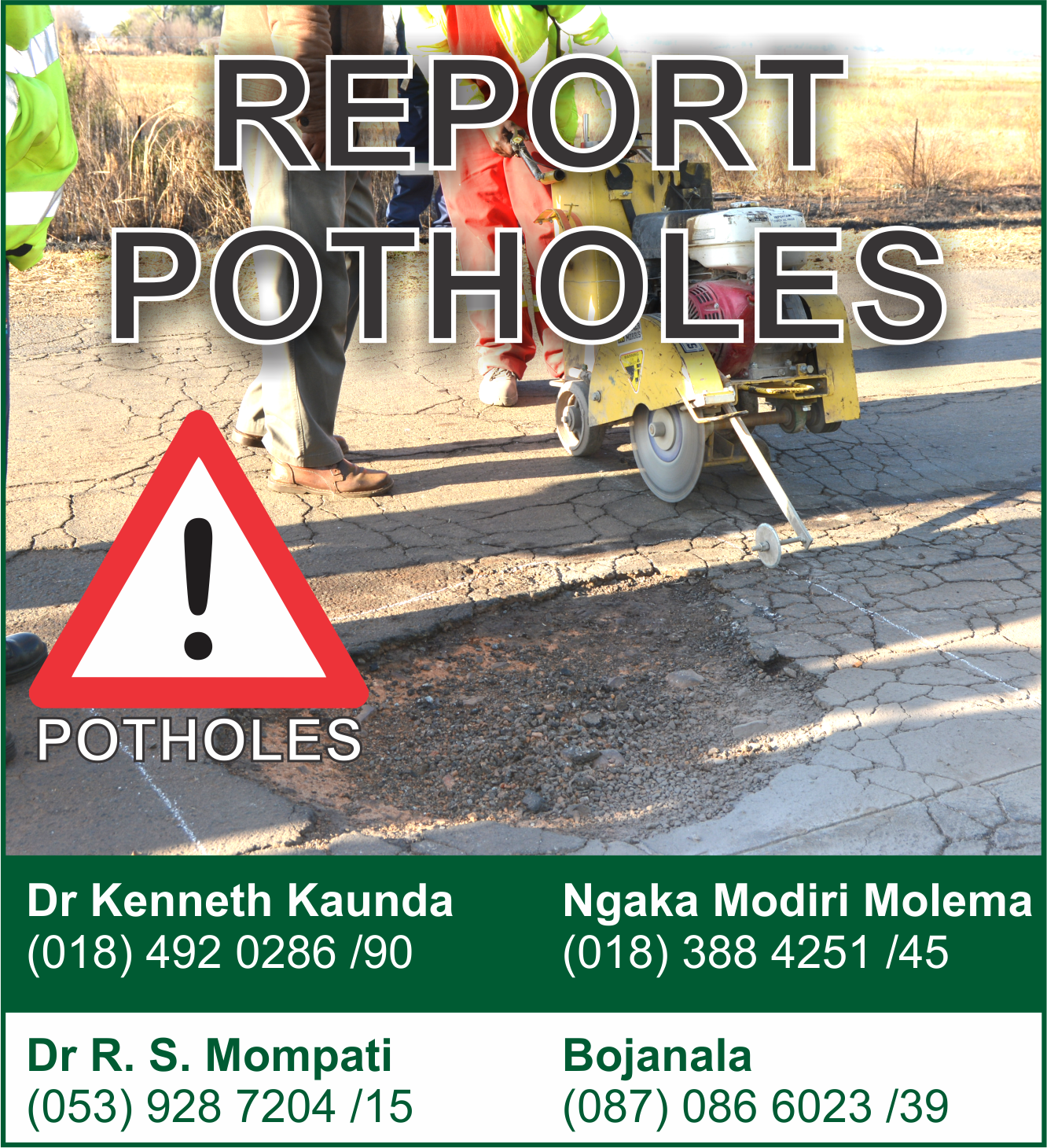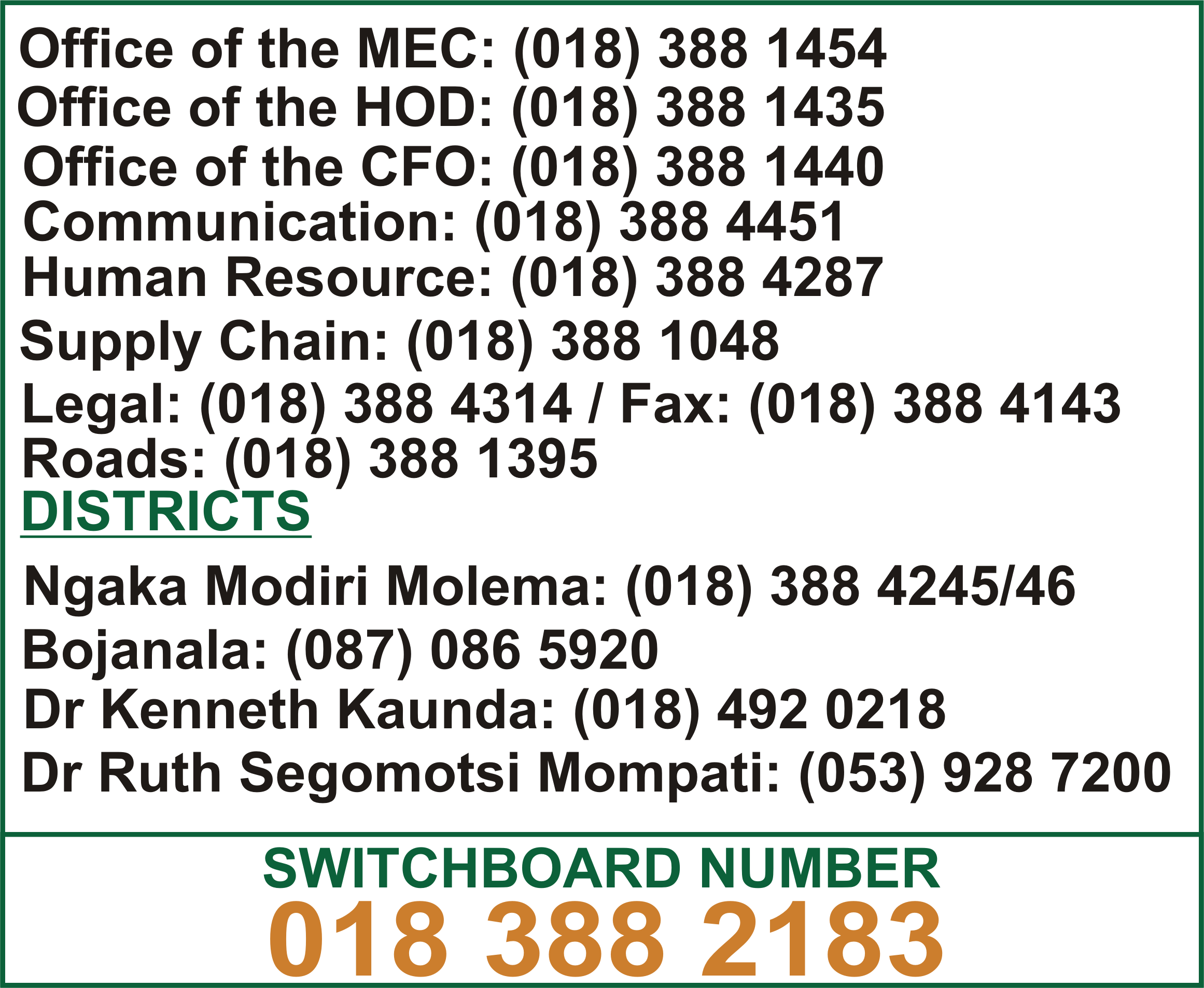The Department's mandate is derived from the Constitution of the Republic of South Africa, 1996 (Act 108 of 1996). Mandates which are exclusive to provinces as well as functional areas that share concurrent responsibility are outlined in schedules 4, 5 and 6 of the Constitution, as follows:
1. LEGISLATIVE MANDATES
The Acts and Regulations assigned to and / or implemented by the Department Include, but are not limited to the following: Transversal public sector acts such as the Public Service Act, the Public Finance Management Act, the Labour Relations Act, the Division of Revenue Act, etc.North West Land Administration Act, Act 4 of 2001 - the Act regulates the acquisition and disposal of immovable property owned by the Provincial Government within the geographical area of the North West Province. Property Valuation Act, Act 17 of 2014 - the Act provides for the establishment of the Office of the Valuer General whose responsibility will be to provide valuation services to Government. Property Valuers Profession Act, Act 47 of 2000 - the Act provides for the establishment of the Council for the Property Valuers Profession and incidental matters. National Public Works Quantity Surveying Profession Act, Act 49 of 2000 - the Act provides for the establishment of the Council for the Quantity Surveying profession and incidental matters. Government Immovable Asset Management Act, Act 19 of 2007 - the Act promotes a uniform, effcient and effective management of state immovable assets. Construction Industry Development Board Act, Act 38 of 2000 - the Act provides for the establishment of the Board to promote the contribution of the construction industry in meeting national construction demand, provide strategic leadership to the construction industry stakeholders to stimulate sustainable growth, reform and improve the construction sector and to determine and establish best practice. Infrastructure Development Act, Act 23 of 2014 - the Act provides for the facilitation and coordination of public infrastructure planning, implementation and development and aims to improve the management of such infrastructure during all life-cycle phases. Green Building Framework, 2001 - the Framework promotes, inter alia, sustainable development, energy efficiency, reduction of greenhouse gas emissions etc. Skills Development Act, Act 97 of 1998 - the Act provides for an institutional framework to devise and implement national, sector and workplace strategies with the aim of developing and improving the skills of the South African work force. Broad-based Black Economic Empowerment Act, Act 53 of 2000 - the Act seeks to address the historical imbalances of the past, to promote the achievement of the constitutional rights to equality and to increase broad-based participation of black people in the economy. It also seeks to promote a higher growth rate, increased employment and a more equitable income distribution. Preferential Procurement Policy Framework Act, Act 5 of 2000 & Preferential Procurement Regulations, 2017 - the Act and Regulations provides for the use of public procurement as an instrument to promote SMME development and to broaden participation in the economy in order to bring about socio-economic transformation. Restitution of Land Rights Act, Act 22 of 1994 - the Act provides for the restitution of rights in land to persons or communities dispossessed of such rights after 19 June 1913 as a result of past racially discriminatory laws or practices. It also provides for the establishment of a Commission on Restitution of Land Rights and a Land Claims Court. 2. POLICY MANDATES The Strategic Plan for 2020 - 2025 and the Annual Performance Plan for 2021/22 are guided by the following strategies and policy pronouncements:National Development Plan
The National Development Plan (NDP) was endorsed by Cabinet early in September 2012. The primary aim of the NDP is to eliminate poverty and reduce inequality by 2030 through six areas of priority:
In order to give expression to the NDP, planning at a provincial level takes into account the developmental status, spatial development and primary economic sectors of the North West Province. Particular focus is placed on both the rural economy as well as on the provision, upgrading and the maintenance of economic infrastructure. These are viewed as preconditions for overall economic growth and development and have significant potential to create employment. The Province also prioritizes the transformation of human settlements, promoting health and fighting corruption. Medium Term Strategic Framework (MTSF) 2019 - 2024 The Medium Term Strategic Framework (MTSF) is the key mechanism to achieve alignment between short- and medium term plans (e.g. sector plans and plans of the three spheres of Government) and the NDP. The MTSF identifies the critical actions to be undertaken during the period 2019 to 2024 to put the country on a positive trajectory towards the achievement of the 2030 vision. It identifies the priorities and outcomes to be achieved in the period. Provincial priorities of the 6th Administration The provincial priorities for the 6th Administration are as follows:
SONA and SOPA priorities The SONA and SOPA priorities that that are relevant to the Department are as follows:
|
- Home
- Our Mandate
- Management
- Speeches
- Press Releases
- Policies
- Strategic Documents
- Tender Bids
- Vacancies
- Links
Member of Executive Council
Head of Department
Vision and Mission
Opearation Kwala kaofela
Quick References:
Report Acts Of Dishonesty
The Department's Mandate










